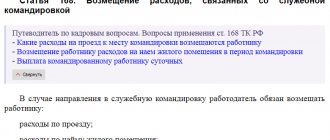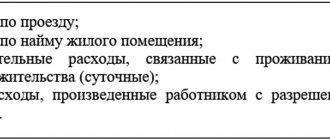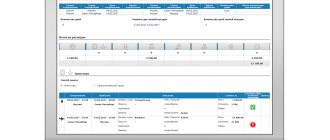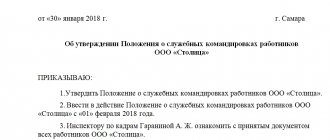Key concepts and legislative framework
First, you need to understand what a business trip is and in what cases it applies.
So, a business trip is the sending of an employee for a certain period of time, agreed upon by the management of the company, to fulfill an assignment given by the company, away from the employee’s place of permanent work.
In addition, dispatch to another division of the same company, located in a different location, is also considered a business dispatch of an employee.
The main document regulating the planning and implementation of activities for the secondment of workers, Decree of the Government of the Russian Federation No. 749 as amended on July 29, 2015.
The trip begins its countdown from the moment of departure of the train, plane or other vehicle on which the employee departs. The day of arrival from a business trip is the day when the train or other transport arrives back. The number of days between these two dates is the actual time spent on work leave .
If travel documents have not been preserved, then the start date is usually considered to be the date of registration at the hotel or the date in the rental agreement. If these documents are not available, then the dates correspond to the dates on which the arrival and departure of the seconded employee at the temporary place of performance of official duties was noted.
All costs associated with renting accommodation and travel are reimbursed by the employer. At the same time, the employee retains his average salary for the duration of the trip.
If a business trip on a weekend takes place outside of Russia, then all payments (including daily allowances) are made in the currency of the country where the employee was sent.
Upon returning from a work trip, the employee is obliged to submit the following documents to the HR department or direct management within 3 working days :
- An advance report of all amounts spent.
- Documents for renting housing for living.
- Documents confirming travel expenses.
- Documents confirming other expenses related directly to the implementation of the tasks assigned to him.
Working conditions on a business trip: violations, incidents and evidence
“Personnel officer. Labor law for personnel officers", 2012, N 4
WORKING CONDITIONS ON A BUSINESS TRAVEL: VIOLATIONS, INCIDENTS AND EVIDENCE
Problems of daily routine and working hours have not been resolved due to insufficient detailed regulation by labor legislation. Modern legislation retains cases when the process of departure or return of an employee from a business trip may contain elements of absenteeism. The author examines them in detail.
According to Art. 166 of the Labor Code of the Russian Federation, a business trip is a trip by an employee by order of the employer for a certain period of time to carry out an official assignment outside the place of permanent work.
Absenteeism is the absence of an employee from the workplace without good reason during the entire working day (shift), regardless of its duration, as well as in the case of absence from the workplace without good reason for more than 4 hours in a row during the working day (shift) (pp. "a" clause 6, part 1, article 81 of the Labor Code of the Russian Federation).
Situation 1. An employee of the organization was sent on a business trip, during which he did not fulfill an official assignment. In addition, the manager received information that this employee was inactive while on a business trip. Can this fact be considered absenteeism and the employee fired?
In Art. 209 of the Labor Code of the Russian Federation contains the definition of a workplace - a place where an employee must be or where he needs to arrive in connection with his work and which is directly or indirectly under the control of the employer.
Currently, the procedure for sending employees on business trips is established in the Regulations on the specifics of sending employees on business trips, approved. Decree of the Government of the Russian Federation of October 13, 2008 N 749 (hereinafter referred to as the Regulations on Business Travel).
The Instruction of the Ministry of Finance of the USSR, the State Committee for Labor of the USSR and the All-Russian Central Council of Trade Unions dated 04/07/1988 N 62 “On official business trips within the USSR” (hereinafter referred to as Instruction N 62), which is valid to the extent that does not contradict the Labor Code of the Russian Federation and the Regulations on business trips, also remains in force.
To date, there is no clear opinion regarding the availability of a workplace on a business trip. According to some authors, an employee has one workplace - it is fixed in the employment contract, so absenteeism on a business trip is impossible; according to others, there is a workplace on a business trip. The undeniable facts are that while on a business trip:
— the norms of the employment contract apply;
- business trip - a place where an employee needs to arrive in connection with his work;
— indirect control is carried out by properly executed documents (travel certificate, official assignment).
From this we can conclude that absenteeism can also be committed during a business trip.
Evidence of absenteeism in this situation may include, in particular:
- failure to complete a production task (if it involved specific actions - setting up equipment, collecting and analyzing information, etc.);
— contents of the report of an employee who arrived from a business trip.
Another evidence of absenteeism on a business trip may be the employee’s failure to comply with the working hours of the host party. Despite the absence in the Business Travel Regulations of an indication of the employee’s obligation to comply with it, paragraph 8 of Instruction No. 62 states that workers on a business trip are subject to the working time and rest time regime of those associations, enterprises, institutions, organizations in which they sent on business trips.
In addition, modern legislation preserves cases when the process of an employee’s departure or return from a business trip, if they are not sufficiently regulated at the enterprise, may contain elements of absenteeism. Let's look at them in more detail.
Absenteeism at the employee’s place of residence
This fact is almost impossible to confirm. An employee sent on a business trip is not subject to the daily routine of the receiving party.
The concept of working hours (WW) is absent in the legislation. Labor Code of the Russian Federation in Art. 100 contains only the requirements for it. Therefore, when writing the article, the author used the definition of RWP contained in the Guide to Personnel Issues of the ATP “ConsultantPlus”, where the working time regime is the procedure for distributing the standard working time of an employee in a specific organization during a certain calendar period (day, week, month, etc. .). And it is this term that is used in Instruction No. 62.
That is, it is appropriate to talk about RRV, keeping in mind the employee and his organization. In our case, an employee of one organization is sent to another. It seems that using this term when talking about business trips is not entirely correct. The concept of “the daily routine of the host party” can be used here. Especially in situations where:
— at the employee’s place of work, the working day begins at 9.00, and at the organization where he is sent, at 8.00;
— the employer’s working day ends at 20.00, and in the organization where the employee is sent, at 18.00;
— in the sending organization, the employee works on a 5-day workweek schedule; in the receiving organization, there is a work schedule with days off on a sliding schedule (2/2).
What should the employee do in this case (what time to leave, return, etc.)? Therefore, in order to avoid controversial situations in travel documents, the employer should clearly record the algorithm of actions (daily routine) of the employee on a business trip. Therefore, it is more appropriate, in my opinion, to adhere to the daily routine established by the employer for the posted worker. And for non-compliance, impose penalties.
If this circumstance is not recorded, then it will be impossible to talk about absenteeism or another disciplinary offense, remembering that a disciplinary offense is the failure or improper performance by an employee, through his fault, of the labor duties assigned to him (Article 192 of the Labor Code of the Russian Federation).
The schedule of the main place of work on a business trip does not apply. The content of the official assignment and the list of actions prescribed by the employer may differ significantly from the employee’s job responsibilities under the employment contract. Accordingly, the procedure for their execution may not coincide with the regime established at the main place of work.
While on a business trip, the employee is not required to adhere to the schedule established at the main place of work. In any case, labor legislation does not require coming to the place of performance of a job assignment on the same days and hours as at the enterprise. Moreover, the operating mode of the receiving party may differ from the operating mode of the organization that sent the employee on a business trip. He could carry out official assignments only on those days and hours when the receiving organization was working. At the same time, the receiving party was not obliged to control the attendance of the posted worker or keep a time sheet.
The above circumstances do not change the following:
— a posted worker must adhere to the work schedule of the host party, unless the employer who sent him on a business trip has a different agreement with the host organization;
- a posted employee is not obliged to carry out an official assignment strictly according to the schedule established by the receiving party for its employees, for example, from 9.00 to 18.00, five days a week, to be on its territory;
— the receiving party does not keep a time sheet for the posted worker.
On a business trip there is a special regime. The mode of activity of a posted employee is determined by the content of the job assignment. To successfully complete a job assignment, the employer has the right to prescribe to the employee a certain procedure for actions on a business trip.
Day of departure and day of arrival from a business trip
According to para. 5 clause 4 of the Business Travel Regulations, the issue of an employee’s attendance at work on the day of departure on a business trip and on the day of arrival from a business trip is resolved by agreement with the employer. However, this document does not specify in what form (written, oral) this agreement should be expressed. This issue is very serious, and its correct resolution will avoid possible disputes between the employee and the employer.
If the organization has business trips very rarely (several times during the year), then the decision on the employee to go to work on the day of departure (arrival) to/from a business trip can be reflected in the order to send the employee on a business trip based on information from documents (travel tickets, etc. .), confirming the time of departure/arrival of the vehicle. In this case, it is necessary to remember the time required to travel to/from the station, pier or airport.
If an organization sends its employees on business trips regularly, then in this case it is necessary to establish the general procedure for employees to report to work on the day of departure on a business trip and on the day of arrival from a business trip, enshrining it in a collective agreement or local regulation. Such a document can be drawn up in the form of a regulation on sending employees of LLC “...” on a business trip, regulations on sending employees on business trips, etc.
The day of departure on a business trip is the date of departure of a train, plane, bus or other vehicle from the place of permanent work of the business traveler, and the day of arrival from a business trip is the date of arrival of the specified vehicle at the location of the organization. When a vehicle is sent before 24 hours inclusive, the day of departure for a business trip is considered the current day, and from 00 hours and later - the next day.
If a station, pier or airport is located outside a populated area, the time required to travel to the station, pier or airport is taken into account.
The day of the employee’s arrival at the location of permanent work is determined similarly.
Departure
Situation 2. The organization has a 5-day work week. Working hours from 09.00 to 18.00 hours. An employee of this organization is sent on a business trip. The train departs from the Belorussky station at 23.00, and the time required to get to the station (from home or work) takes 1.5 hours. Will the employee go to work on this day?
It is necessary to take into account that the employee needs to prepare for a business trip (pack things, rest before the trip). Therefore, a local regulatory act may provide for various options for resolving this issue, expressed in the following formulations:
— “on the day of leaving on a business trip, the employee does not go to work”;
- “on the day of departure, the employee is obliged to go to work and work until lunch.”
In the second case, it will also be necessary to correctly reflect in the time sheet the employee’s attendance at work on the day of his business trip.
In practice, it is not possible to accurately determine the time required to travel to a station, pier or airport, as well as the time sufficient for proper rest for an employee.
Arrival
Situation 3. The organization has a 5-day work week. After a business trip that ended on Wednesday (the plane arrived at the airport at 10:35 p.m.), the employee returned to work only on Friday. Before leaving on a business trip, an agreement was reached with the employee that he would report to work the day after his arrival, that is, on Thursday. The employee explained his absence on Thursday by saying that the plane arrived on schedule, but he arrived home only at 00.40 on Thursday. Is it possible to qualify an employee’s failure to show up for work the next day after a business trip as absenteeism?
Failure to show up the next day can be classified as absenteeism, but the employee in this case went to work exactly the next day, since, having arrived home at 00.40 on Thursday, he was considered to be on a business trip that day (clause 4 of the Business Travel Regulations).
In the situation under consideration, the employer did not take into account the time required for the employee to travel to his place of residence. But there are designs that make it possible to provide for an agreement on the employee going to work on the day of his return from a business trip. In this case, in the order or in the local regulatory act of the enterprise, it is necessary to record various models of behavior of the employee when returning from a business trip:
— on the day of arrival from a business trip, the employee does not go to work;
— if an employee returns home from a business trip before 03.00, then taking into account the time necessary for the employee to rest and prepare for the working day, he must arrive at the workplace by 14.00.
In order to avoid disputes related to reporting to work after a business trip, the personnel service or other structural unit responsible for sending workers on a business trip should agree with the employee on the day of return to work before the start of the business trip and determine it in the order for sending on a business trip or consolidate the achieved agreement in another written document, taking into account the requirements of the Business Travel Regulations.
Failure to complete a job assignment
One of the main pieces of evidence confirming the employee’s fulfillment of the employer’s instructions, along with a travel certificate, is a properly executed official assignment. And if, when traveling on business trips across the territory of the Russian Federation, a travel certificate is issued, a log of arriving workers is kept, in which marks are placed on the time of arrival (departure) and the seal of the receiving party, that is, there are signs that allow us to conclude that the employee was at least physically present in the organization, then When traveling abroad, these documents are not issued. In addition, the marks themselves cannot indicate the nature of the actions performed on a business trip. Therefore, the main document confirming the production nature of the tasks performed on a business trip remains the official assignment.
Clause 26 of the Regulations states that within 3 working days upon returning from a business trip, the employee submits a report. In practice, the report is filling out the back side of the job assignment. It is unlikely that the employer will have any questions for the business traveler if the goals of the business trip are 100% achieved, but what if the goal is not achieved, and even for reasons depending on the employee? Then a detailed report on the work performed during the business trip is required. And obviously, there may not be enough lines in the service task. In this case, it is advisable to draw up an additional document describing in detail the type and nature of the work performed on a business trip. Such a document can be an explanatory note to the official assignment, a report on the work done, a report on the degree of achievement of the objectives of the official assignment, etc. This document is internal, therefore its name, form and details will be determined by the head of the organization or other authorized body.
To draw correct and objective conclusions that influence the qualifications of an employee’s behavior (completing a task or absenteeism), the structure of such a document must contain information about:
- performance of specific actions, work done while on a business trip (at what time, in what place, the total duration of the activities performed, the frequency and method of informing the employer about the extent to which the assigned tasks have been achieved, about the possibility of extending (or canceling) the period of stay on a business trip, etc. .);
- the degree of influence of objective circumstances on the results of a business trip (natural anomalies, disasters, terrorist attacks at the place of stay and route, illegal actions against his person and his property, economic, political and social factors, etc.);
— intermediate results of achieving the goals of the official assignment (the time required to make a final decision to potential partners, the expiration of the test period of the equipment, etc.);
— a set of activities, the implementation of which will contribute to the performance of the job assignment in the future.
Along with a written statement of the circumstances of the execution of the official assignment, it would be appropriate to attach documents that directly or indirectly confirm them.
The information obtained will allow you to evaluate the employee’s actions on a business trip.
Along with the above, it is necessary to understand that the more accurately the task is set for an employee leaving on a business trip, the easier it will be to check its results in the future. Therefore, you should avoid common phrases and interpretations when preparing a job assignment.
Forced (stop) delay
Situation 4. An employee of the organization was sent on a business trip to Thailand in the period from 10/01/2011 to 10/15/2011. While at the airport, the employee reported that his flight was canceled due to major flooding. How to correctly prove the circumstance of forced delay, and not absenteeism of the employee?
In the event of a forced delay in transit, daily allowances for the delay are paid by decision of the head of the organization upon presentation of documents confirming the fact of the forced delay - the requirement of clause 18 of the Business Travel Regulations.
In the situation under consideration, evidence of the fact of a forced delay will be media reports about a natural disaster, accident, catastrophe, as well as a certificate from the transport organization about the reasons for the flight delay. As a rule, such a document (certificate) is made in a foreign language, so for use in a Russian organization it will be necessary to have a line-by-line and notarized translation.
Temporary incapacity for work on a business trip
Very often, while on a business trip, an employee reports his temporary disability. This is often due to acclimatization, the specifics of national products and water (especially when traveling to foreign countries), exposure to harmful insects, etc. How to correctly prove the fact of a real illness and not absenteeism?
Situation 5. An employee of an organization was sent to South Africa for a period of 10 days to study the properties of diamonds. While on a business trip, he was bitten by a poisonous insect. The employee was forced to seek medical help, thereby temporarily stopping the performance of his official assignment. A certificate was issued to him by a foreign medical institution. How to correctly confirm the fact of illness of an employee on a business trip?
In the event of temporary incapacity for work, certified in the established manner, the employee is reimbursed for the cost of renting a living quarters and is paid daily allowances for the entire time until he is unable, for health reasons, to begin fulfilling the official assignment assigned to him or to return to his place of permanent residence. This is indicated in clause 25 of the Business Travel Regulations. During the period of illness, the employee is paid temporary disability benefits in the usual manner.
It is important to correctly understand the requirement - proper certification of temporary disability. An employee’s illness during a business trip across the territory of the Russian Federation will be confirmed by a certificate of incapacity for work issued by the relevant medical institution. In addition, in the future, this document can indirectly confirm the location of the employee (a specific city). The form of this document was approved by Order of the Ministry of Health and Social Development of Russia dated April 26, 2011 N 347n, and the Issuance Procedure was approved by Order of the same department dated June 29, 2011 N 624n “On approval of the Procedure for issuing certificates of incapacity for work” (hereinafter referred to as the Procedure for issuing certificates of incapacity for work).
The greatest number of questions and disputes arise if an employee falls ill during a business trip abroad. At a foreign medical institution, he was given an appropriate document confirming his temporary disability (for example, a certificate). It is impossible to apply and use such a document as a basis for calculating various payments and justifying the illness of an employee on a business trip in the Russian Federation. Moreover, it will be written in a foreign language. In such a situation, a document issued by a foreign medical institution should be exchanged for a Russian-style certificate of incapacity for work. This condition was enshrined in clause 8 of the Procedure for issuing certificates of incapacity for work by medical organizations, approved. Order of the Ministry of Health and Social Development of Russia dated August 1, 2007 N 514, and remained in the current Procedure for issuing certificates of incapacity for work, clause 7, without changes.
To exchange a foreign document confirming temporary disability, it must be legally translated into Russian. The legislation does not contain a definition of legalized translation. It seems that such a translation must be made line by line and certified by a notary. Then you should contact the medical organization at the employee’s place of residence in Russia or the departmental medical institution at the place of work with a request to replace the document. The decision on the possibility of replacing the document with a certificate of incapacity for work of the standard standard in the Russian Federation is made by the medical commission of the specified medical institution.
If at the place of business trip a sick employee was forced to go to the hospital, the employer is not obliged to reimburse him for the costs of renting living quarters for the days he was in the hospital (hospital, hospital). Reason - clause 25 of the Regulations.
Practice shows that due to the employee’s illness and the need to fulfill the employer’s instructions, the duration of his business trip will increase. Extension of a business trip must be issued by order of the head of the organization. The presence of this document with a certificate of incapacity attached to it will help the employer justify the cost of paying daily allowances for additional days of business travel. In addition, these papers will document the validity of the costs of purchasing return tickets for a later date, as well as the costs of tickets that could not be returned to the carrier (if the tickets were purchased without the right of return) or when returning to the box office part of their cost was withheld.
Sending a part-time worker on a business trip
Part-time work is the performance by an employee of another regular paid job under the terms of an employment contract in his free time from his main job (Article 282 of the Labor Code of the Russian Federation).
The procedure for sending part-time workers on a business trip does not differ from the procedure for sending workers at their main place of work on a business trip.
However, there are issues in this area that are not regulated by law. Thus, in particular, the correct registration of the reason for the employee’s absence from the workplace of another employer deserves attention. The most appropriate and logical is to take a vacation at your own expense. But it must be taken into account that from the meaning of Art. 128 “Leave without pay” of the Labor Code of the Russian Federation it follows that providing this kind of leave is not an obligation, but a right of the employer. It follows that if an employee cannot agree with the employer at his main place of work on leave without pay, his absence from the workplace can be classified as absenteeism.
Bibliography
1. Regulations on the specifics of sending employees on business trips, approved. Decree of the Government of the Russian Federation of October 13, 2008 N 749.
2. Instruction of the Ministry of Finance of the USSR, the State Committee for Labor of the USSR and the All-Union Central Council of Trade Unions dated 04/07/1988 N 62 “On official business trips within the USSR.”
3. Order of the Ministry of Health and Social Development of Russia dated April 26, 2011 N 347n “On approval of the form of a certificate of incapacity for work.”
4. Order of the Ministry of Health and Social Development of Russia dated June 29, 2011 N 624n “On approval of the Procedure for issuing certificates of incapacity for work.”
5. Order of the Ministry of Health and Social Development of Russia dated August 1, 2007 N 514 “On the Procedure for issuing certificates of incapacity for work by medical organizations.”
M. Esin
Expert
First House of Consulting
"What to do Consult"
Signed for seal
13.03.2012
What should I do if my departure date falls on a weekend?
Often there is a need to be present at a temporary workplace on Monday morning. That is, the posted employee will have to leave in advance: on Saturday or Sunday. How do I pay for a business trip on a day off?
Payment for days off on a business trip can be made in two ways:
- Double payment.
- Single payment if the employee has expressed in writing a desire to take time off for that day.
In this case, daily allowances are paid strictly for the number of days that the trip lasted.
The previous version of the Resolution specified the maximum period during which an employee could be on official absence - 40 days.
After these days, if necessary, one business trip was closed and a new one was immediately opened by order. There are no such restrictions in current legislation: the duration of the business trip is determined by the organization.
In addition to the first case, when the road takes up a day off, it also happens that an employee is forced to spend the weekend away without returning home .
Are these days payable? The situation is similar here, only one nuance differs: whether or not the employee performed his official duties on those days.
If an employee was involved in this on a day off (and there is an order about this), then double payment or time off and single payment occurs. If the employee did not work that day, then such day is not subject to payment.
How to calculate travel and daily allowances?
How are travel allowances calculated and paid on weekends? Calculating travel allowances is similar to calculating vacation pay. But, unlike the latter, it is not calendar days that are subject to recording, but working days. These payments are required, even if the employee leaves for one day. In case of a one-day trip, per diem is not paid.
To calculate travel allowances, you need to calculate the employee's average earnings for the previous year . To do this, all wages paid to the employee for the year are taken (excluding social benefits, other business trips and similar payments) and divided by the number of days worked.
This is how the employee’s average earnings per day are obtained. The result obtained must be multiplied by the number of working days that the employee will spend on a business trip.
For example:
Employee Pilkin Ivan goes on a business trip to another branch of the company for a period of five days. Management, accountants and personnel officers bring up reports and schedules of Pilkin’s visits for the previous year.
After deducting all weekends, vacations and time off, it turned out that Pilkin worked 200 working days. At the same time, he received 28,000 rubles a month.
Pilkin's average salary = 28,000*12/200 = 1,680 rubles per day.
Pilkin's travel allowance for five days will be:
K = 1,680*5 = 8,400 rubles.
The daily allowance on weekends on a business trip is calculated by the head of the company or an authorized person. The law establishes only their standard size when on a business trip :
In Russia – 700 rubles per day. In other countries – 2,500 rubles per day.
These amounts are not subject to income tax. Any excess is already considered by the Tax Code as income of an individual, and therefore the amount in excess of the standard daily allowance is subject to tax.
The question is also often asked: a business trip on a day off, how to issue an order? A sample order can be downloaded below. It is standard; a separate order is issued regarding employment on a day off due to production needs.
Order to go on a business trip
Order to hire someone to work on a day off
What is a business trip - types of business trips
The concept of a business trip in the Labor Code of the Russian Federation is strictly enshrined in Article 166. Everyone knows that this means the departure of an employee to another locality by order of the employer for a period established by his superiors.
Please note that during the period of departure the specialist will not lose his job - it will remain with him.
His average salary will also remain the same - he will receive it in the amount in which he received it.
He will receive a separate additional payment for the business trip and all related expenses.
The legislation provides for several types of business trips:
- Within Russia/abroad of the Russian Federation.
- Short term/long term.
- Singles/groups.
- Planned/unplanned.
Any travel for work must be characterized; in addition, its purpose must be clearly stated. Careful attention is paid to business trips that will be carried out outside of Russia.
Not all business trips are considered business trips. In accordance with Article 166 of the Labor Code of the Russian Federation, we can clearly identify citizens for whom a business trip will not be counted.
Here is a list of activities that do not qualify for a business trip:
- Unofficial activity, without an employment contract.
- Work of a traveling nature - for example, a conductor in railway transport.
- The work of specialists who are constantly on the road - for example, a driver.
Let us remind you that not all citizens can be sent on a business trip; and if these categories of workers are nevertheless sent on a trip, then it will not be possible to compensate for travel allowances.
The law prohibits sending on a trip on official assignment:
- Minors.
- Pregnant employees.
- Employees with whom the company has entered into an apprenticeship agreement. They can be sent on a business trip for training!
- Citizens who stand for election.
- Employees on sick leave.
It is also worth considering workers who may be sent on a business trip - but subject to certain documentation requirements.
For example , an employee with a child must sign an agreement to travel, or an employee whose family has a disabled person who needs care must also sign an agreement to travel.
Otherwise, it will not be possible to send these citizens on a business trip.
Other employees can be sent on a trip on official assignment, even without obtaining their prior written consent.
Filling out a time sheet
Even if an employee is on a business trip, the HR department is required to mark him on the report card.
How does this happen?
The days that fall on such absence are marked with one of two types of designations:
- letter – “K”; numeric – “06”;
If the trip falls on a weekend or holiday, then it is illegal to put one of these designations, since work on weekends on a business trip is paid at double the rate. In this case, the designation “РВ” or “03” is given. This is on the one hand.
On the other hand, you can put two marks on the report card at once to reflect that the employee is on a business trip on weekends and holidays . This will be more appropriate for the correct calculation of charges. Payment for business trips on weekends and holidays is made in the same order.
In addition, putting two marks at once is a guarantee that all payments will be received in the established amounts and the employee will retain all his rights during his absence from his main workplace.










